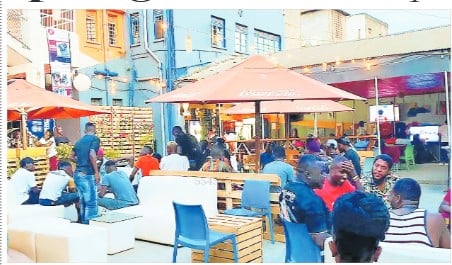Prime
When banks close, what happens to your money?

Customers in a banking hall. The Deposit Protection Fund uses your personal information as provided to the bank to offer you deposit insurance when your bank closes. PHOTO/Kelvin Atuhaire
What you need to know:
Depositors should update personal information with their respective financial institutions to ensure timely and convenient payment of their deposits in the unlikely event that a bank winds up.
Banking crises have often left some customers struggling to claim their deposits.
Closed banks such as Greenland Bank, Teefe Bank, International Credit Bank, Cooperative bank, National Bank of Commerce, Global Trust Bank and Crane Bank Limited, not forgetting Nile Bank which changed hands to Barclays and now Absa are some examples of bank crises that affected some customers.
Central Bank governor Emmanuel Tumusiime Mutebile, while appearing before the parliamentary committee on Commissions, Statutory Authorities and State Enterprises (Cosase) on the probe into the closure of the banks in question in 2018, said Central Bank closed the seven banks in question to protect the country’s banking system.
He said the Central Bank was right to intervene and close down the seven defunct banks.
“Bank of Uganda was right to intervene in the financial institutions. Any delay to act or lack of decisiveness on the action taken would have created financial crisis, danger to savers, borrowers, businesses and the economy at large,” Mutebile said.
But in what position did this leave savers who only go to banks to keep their hard-earned money safely while saving for their future.
To date, some of the account holders in the seven defunct banks still demand to be compensated because even those with bad loans were willing to pay off their bad loans to rescue their properties but they were never helped.
To some who have been transferred from one bank to another, claiming their deposits has been a hustle.
Mr Ceaser Mukasa explains his ordeal of being transferred from one bank to another without his knowledge.
Mr Mukasa says he owned an account in Nile Bank but this was bought off by Barclays Bank in 2007 and in present day, it is called Absa bank.
“I did not know how Nile Bank had already transferred us to Barclays. This was not a bank of my choice. If Nile Bank was going to close down business, it would have notified customers in this bank before forcefully transferring us to Barclays,” he narrates.
“I did not want to be a customer in the new bank. I sought to close the account in the new bank but it seems they did not want me to leave the bank. It was after I tried causing mayhem that they allowed me to close my account and move my money to another bank of my choice,” Mr Mukasa says.
Mr Mukasa opted for Crane Bank which was also liquidated to dfcu bank.
He says he had no option but to shift to dfcu bank even when this was not his choice.
“I was tired of shifting from one bank to another. I just accepted to have an account in dfcu Bank. I did not want again to cause mayhem like I did in Barclays Bank when I went to claim my deposits to transfer them to another bank”, Mr Mukasa says.
However, Mr Mukasa is ignorant about the Deposit Protection Fund of Uganda (DPF), a legal entity created by the government to ensure depositors are paid their protected deposits in the event of failure of a Contributing Institution.
The Fund uses your personal information as provided to the bank to offer you deposit insurance when your bank closes.
But no bank closes without the Central Bank’s knowledge. “Their involvement ensures that deposits are protected and they are duly informed of the position regarding their deposits,” Ms Getrude Wamala, the head corporate and commercial practice at Sebalu and Lule Advocates says.
“In the event that one is not helped by their former bank, they can go to DPF,” she says.
According to Ms Julia Clare Oyet Olima, the chief executive director DPF, in a recent interview with Daily Monitor, banks, credit institutions and microfinance deposit-taking institutions (MDIs) that are regulated by Bank of Uganda remain a safe place to keep your money. But bank bankruptcy cannot be under looked.
“Although it is unlikely to happen in the short term given the robust and stringent measures instituted by the banking industry regulator, endeavour to provide your details with your bank to avoid panic in the unlikely event that your bank goes under liquidation,” Ms Oyet says.
In case of compensation, you are in safe hands with DPF. Just like insurance takes care of your assets, DPF will, subject to terms and conditions, with a lot of ease be able to pay out claims ranging up to Shs10m.
This has been informed by research whose findings indicate that majority of savers/depositors have less than Shs10m at any given time.
In the unlikely event of a bank closure for outright liquidation, payment of protected deposits will be done through an alternative bank account or registered mobile money number.
Depositors are encouraged to update their personal details with their respective bankers, by submitting their National Identification Number (NIN), an alternative bank account number or mobile money number.
DPF requires this information in order to ensure timely and convenient payment of protected deposits to customers in the unlikely event of closure of a financial institution for outright liquidation. This is in line with the Fund’s mandate as stipulated in the Financial Institutions Act of 2004.




